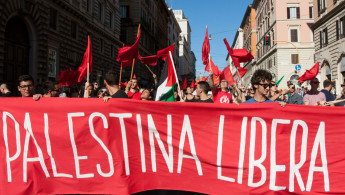Italy and a 'new beginning' towards Palestine?
Palestinian Land Day is commemorated worldwide every year on 30 March. It is an important anniversary for Palestinians dating back to 1976, when thousands of Palestinian citizens in Israel gathered to protest against the expropriation of Palestinian land in the Galilee.
During the protests, clashes broke out with the Israeli police, and six Palestinians were killed, hundreds injured and hundreds more arrested. Over the years, that day became known as Land Day. The 1976 protest was the first act of mass resistance by Palestinians inside Israel against Zionist internal colonialism.
First, second and third generation Palestinians living in Italy - in total about 20,000 - organise meetings, discussions and workshops in different locations to remember the event.
The first groups of Palestinians arrived in Italy in the 1970s and 1980s to study. After arriving they organised themselves into political movements that supported the Palestinian cause, and were typically secular and leftist.
In the late 1980s and early 1990s young Palestinians with a stronger religious identity began arriving in Italy: some were members of the Muslim Brotherhood.
For all the Palestinians living in Italy, whether secular or religious, political activism in favour of the inalienable rights of Palestinians was a constant, alongside study and work commitments.
| Since the early 90s, Italian support for the Palestinian cause has decreased and turned into support for Israel. |
Many of the Palestinian students returned home after graduating, especially in subjects such as medicine, architecture, engineering, while others stayed in Italy. Those that remained behind typically established a family and found work, but they continued to maintain strong links with their homeland, and show a strong political and social commitment to the Palestinian cause.
Nowadays, among those most committed to efforts of national solidarity we find Muslim Palestinians who are working in charitable associations that promote many projects in Palestine, especially the Gaza Strip. They relentlessly organise events, activities and meetings to increase awareness among Arab communities and the Italian people about the tragic situation in Palestine.
Palestinian and Italian secular and leftist groups are also actively spreading news and information on the situation in the Occupied Territories. They do this using social media such as blogs and other social networks to promote, for example, the BDS campaign – boycott, divestment and sanctions - and projects in the Gaza Strip.
However, Italy today is different from the 1960s, 70s and 80s when politicians were sensitive to the Palestinian cause. Relations have changed radically. Previously, the politics of solidarity were not only motivated by economic and political interests but also by the activism of Italian and Palestinian popular movements, which were strong and supported by labour unions and political leaders.
Since the early 90s, Italian support for the Palestinian cause has decreased and turned into support for Israel. From being an important European supporter, Italy has become one of Israel's best friends.
However, there are movements and political parties in Italy that have recently shown strong support for the Palestinian cause, by making public statements and travelling to Palestine. These include the 5 Star Movement and SEL, which received delegations of Palestinians at the Italian Parliament in February 2015.
These two parties, however, do not represent most Italian politicians who are pro-Israel. Although the Italian Parliament failed to find a unified position last February on recognising a Palestinian state, the political consensus in favour of the Palestinians seems to increasing again. Could this mean Italian foreign policy is embracing a "new beginning" in its approach towards this Middle East?
Opinions expressed in this article remain those of the author and do not necessarily reflect those of al-Araby al-Jadeed, its editorial board or staff.



